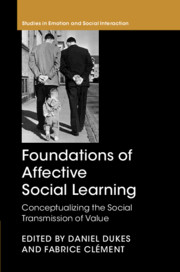Book contents
- Foundations of Affective Social Learning
- Studies in Emotion and Social Interaction
- Foundations of Affective Social Learning
- Copyright page
- Dedication
- Contents
- Figures
- Contributors
- Preface
- A difficult introduction to affective social learning
- Part I On the evolutionary foundations of affective social learning processes
- Part II On human development and affective social learning
- Part III On the mechanics of affective social learning
- Part IV Applications of affective social learning
- Chapter 8 Chastening the future
- Chapter 9 Insights from culture and emotion research for affective social learning
- Conclusion
- Index
- Studies in Emotion and Social Interation
- References
Chapter 8 - Chastening the future
What we learn from others’ regret
from Part IV - Applications of affective social learning
Published online by Cambridge University Press: 09 August 2019
- Foundations of Affective Social Learning
- Studies in Emotion and Social Interaction
- Foundations of Affective Social Learning
- Copyright page
- Dedication
- Contents
- Figures
- Contributors
- Preface
- A difficult introduction to affective social learning
- Part I On the evolutionary foundations of affective social learning processes
- Part II On human development and affective social learning
- Part III On the mechanics of affective social learning
- Part IV Applications of affective social learning
- Chapter 8 Chastening the future
- Chapter 9 Insights from culture and emotion research for affective social learning
- Conclusion
- Index
- Studies in Emotion and Social Interation
- References
Summary
In this chapter we discuss the ways in which expressions of regret provide “lessons” for observers of those expressions, thereby constituting a case of affective social learning. We review three lines of research to argue that another person’s regret tells us something about the aversive consequences of a decision made by that person and influences our own behaviour when we have to make a similar decision. In the first line of research we found that participants who had seen another person acting unfairly but then expressing regret – as opposed to pride – were more likely to anticipate regret if they were to act the same way, and this anticipated emotion affected the likelihood of participants themselves acting fairly. This “lesson” learned by witnessing another person’s regret can also be extended to relations between groups. In the second line of research, observers appeared to “learn” from an out-group’s expression of regret that members of the out-group were unhappy about the decision they took, which encourages the observers to see the out-group as more trustworthy. In the third line of research, we show that similar effects are found when an in-group member expresses regret about the in-group’s failure to reciprocate the trust shown by an out-group. Thus, expressing regret serves the function of communicating the inappropriateness of the in-group’s decision and thereby encourages trusting behaviour in other in-group members. Our contention is that the effects of emotional expression in the experiments described here are due to shifts in the perceived appropriateness of certain behaviours, shifts that result from a process of affective social learning.
- Type
- Chapter
- Information
- Foundations of Affective Social LearningConceptualizing the Social Transmission of Value, pp. 187 - 204Publisher: Cambridge University PressPrint publication year: 2019



